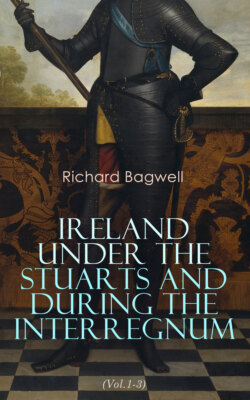Читать книгу Ireland under the Stuarts and During the Interregnum (Vol.1-3) - Bagwell Richard - Страница 28
FOOTNOTES:
Оглавление[189] Wentworth to Charles I., January 22, 1633–34, enclosing his opinion concerning a Parliament, with the King’s answers dated April 12; Wentworth to the Lord Marshal (Arundel), March 22, 1633–34—all in Strafford Letters.
[190] The King to Wentworth, April 17, 1634; Wentworth to Coke, April 29 and May 13; Laud to Wentworth, May 14, all in Strafford Letters.
[191] Wentworth to Coke, May 13, 1634, Strafford Letters.
[192] Earl of Cork’s Diary at May 30, 1634, in vol. iv. of Lismore Papers, 1st series. Wentworth to Coke, June 24, Strafford Letters.
[193] The primacy of Armagh was practically settled on this occasion, but the Roman Catholics still agitated the question for some time. The controversy is exhausted in Archbishop Hugh MacMahon’s Jus Primatiale Armachanum, published in 1728. Carte’s Ormonde, i. 64. Wentworth to Coke, May 13, June 24, August 18, 1634. The order of proceeding, with the roll of the Lords, is given in the Strafford Letters after the last date, and in the journals.
[194] Irish Lords Journals. July 14 and 15, 1634.
[195] Wentworth to Coke, August 18, 1634. The Lord Deputy’s speech in Strafford Letters, i. 286, is not entered in the Journals of Parliament. Wentworth to Cottington, ib. August 22; to Laud, ib. August 23, State Papers, Ireland, February 23, 1641.
[196] Wentworth to Coke, August 18, 1634. Irish Statutes, 10 Car. I., session 2. Parliament was prorogued on August 2, on account of the harvest and circuits. The Subsidy Bill was read a third time and sent to the Lords on July 26, Irish Commons Journals.
[197] Wentworth’s letter to the King is dated September 20, and the answer October 23, Strafford Letters.
[198] Commons of Ireland to the Lord Deputy, in Strafford Letters, i. 310. The Lord Deputy’s Protestation, ib. 290.
[199] Parliament met November 4, 1634, and was prorogued December 15. The graces, with the advice of the Lord Deputy and Council, October 6, Wentworth to Coke, December 16, Strafford Letters.
[200] Wentworth to Coke, December 16, 1634; Coke to Wentworth, March 25, 1635, Strafford Letters. Lords’ Journals, November 25, 1634, April 6 and 15, 1635. Gookin’s letter is calendared among State Papers, Ireland, under 1633, p. 181 (Addenda): it was not written until after Wentworth’s arrival, late in July.
[201] Irish Commons Journals, November 4 and 15, 1634. The act of Council condemning Dongan was signed by George Shirley, Wandesford, Mainwaring, Sir Charles Coote, Sir J. Erskine, and Adam Loftus. Coventry to Wentworth, December 24, 1635, and the answer, March 1, 1636, announcing a further leave of six months to Price, Strafford Letters; Wentworth to Price, February 14, 1636, in State Papers, Ireland.
[202] Wentworth to Coke, December 16, 1634, with the King’s answer of January 22; Coke to Wentworth, January 21; Wentworth to Coke, April 7, 1635; the Commons of Ireland to the Lord Deputy, April 1, in Strafford Letters, i. 408; Irish Commons Journal, March 20, 1634–5; Wentworth to the Earl of Danby, April 21, 1635. There were two short sessions between January 26 and April 18, the date of dissolution. At the beginning a good many days were lost by the non-arrival of Bills from England.
[203] Mant’s Irish Church, 121; Ball’s Reformed Church of Ireland, 108; Cal. of State Papers, Ireland, April 28, 1615. The Irish Articles of 1565 and 1615 are printed as an appendix of Elrington’s Life of Ussher, Works, i. xxxv.
[204] Wentworth to Laud, August 23 and December 16, 1634, and Laud’s answer of October 20, in Strafford Letters; Wentworth’s letter to Leslie, December 10, 1634, is in Laud’s Works, vii. 98; Ussher to Dr. Ward, September 15, 1635, in his Works, xvi. 9; Bramhall’s account of the proceedings, written some years later, is in his Works, v. 80.
[205] Sir Thomas Roe to the Queen of Bohemia, December 10, 1634, from London, and her answer from the Hague, February 1½1, 1635, in State Papers, Domestic. Roe contemplated a visit to Ireland about this time, but does not seem to have made it; see Wentworth’s letter to him of September 1, 1634.
